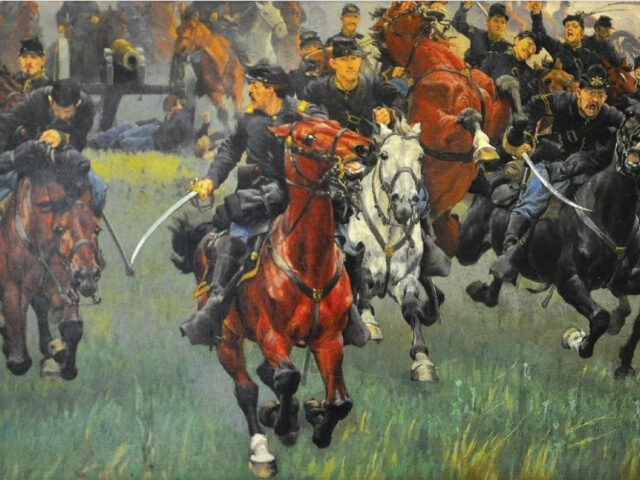As warfare evolves, elite units play an ever-increasing role, but not every soldier can perform these specialized duties. Special operations forces require special men. Union major Henry Harrison Young was such a man—born for war. “It was very rare to find a man who found in the most deadly peril his greatest pleasure, and who sought out danger not only in the line of duty.
The previously untold story of Henry Young and the Civil War units that inspired the creation of America’s special forces is explored in my forthcoming book The Unvanquished: The Untold Story of Lincoln’s Special Forces, the Manhunt for Mosby’s Rangers, and the Shadow War That Forged America’s Special Operations.
Young’s commanding officer observed, “We had many officers who in civil life had shown nothing above average ability, that in the hour of trial, amidst the carnage of battle, proved themselves possessed of heroic quality, yet these gallant men were not fearless; they loved life, and they knew the danger they were going to meet, and could be relied upon to charge up to certain death without faltering.”
Young, however, was truly fearless, a five-foot-five, wiry Rhode Islander who relished the thrill of combat. His brigade commander remembered, “He was always ready to dash through the hottest place, to cheer on a wavering regiment or to rally a disorganized one.” After completing a dangerous mission in which Young obtained intelligence captured General Philip Sheridan’s attention: “I have been looking for that man for two years, and I want him.”
Young’s current boss adamantly protested the transfer. He eventually, however, acquiesced for the best interests of the Union.
Sheridan wanted to expand his elite scouts and put them under the leadership of a hands-on, fighting officer. Young fit the bill perfectly. To penetrate enemy lines, he would don a Confederate uniform. A master of disguise, the Rhode Islander served behind the lines so often that “his disguises had to be changed and varied constantly; now it was one role, now another—private soldier, deserter, countryman, peddler, Confederate officer.” A contemporary who interviewed Young’s men and relatives wrote of the dashing officer that he was “imperturbably cool, patient, shrewd, and with a quiet way about him, yet frank and ingenious—it seemed that there was nothing he could not accomplish.”
While scouting, he once came upon a Confederate recruiting station and allowed himself to be recruited. Young showed up on the appointed day, but instead of joining the Confederate army, he captured the sergeant, all his “hard-earned recruits, and the entire contents of the office.”
In pursuit of one notoriously dangerous Confederate who “boasted that he never was so happy as when he let out the life-blood of a Union prisoner,” Young requested three Rebel uniforms and two soldiers. Their target wounded one pursuer and shot the horse out from under the other, leaving Young to battle the man in hand-to-hand combat alone. Somehow, the Rhode Islander single-handedly managed to apprehend the culprit.
Once Sheridan had found the man to lead his Jessie Scouts, he decided to make it a larger organization. Realizing the news would leak to the Confederates, the general called it a battalion of Scouts when it was, in fact, only a company. With the sixty Sheridan Scouts, as they would come to be known, “We frequently went into the Rebel line, learned to talk the Southern language and became familiar with each regiment, brigade, division, and corps of the Rebel army, and after that went among them as full-fledged Rebels.”
After his Scouts received weapons and Confederate uniforms, Young decided an exceptionally difficult mission was needed to forge unit cohesion and discipline and planned to have his tiny band ambush a large unit of Confederate cavalry many times the Scouts’ numbers. Positioning his men on horses behind trees where the Confederates often passed to create a kill zone, they waited until the Confederate cavalry rode into sight.
On Young’s “shrill signal, [he] whirled his horse about, and fired his [Spencer] carbine in the faces of the Confederate troops. His men followed him; the carbines roared like artillery; bullets raked the column, down whose bloody lanes the Yankees rode at the charge, firing their revolvers on either side without mercy.” The charge routed the massive Confederate force while Young lost only one man. Like his nemesis John Singleton Mosby, whom Lincoln’s Special Forces hunted, Young proved a master of psychological warfare, fighting the Confederates by creating a fear of an unseen enemy. Lincoln’s Special forces would lead Sheridan’s army to victory, and then, as the war came to a close, these commandos would covertly be sent to fight in one of America’s first proxy wars against a European power, against the French, who had tens of thousands of troops in Mexico. Young and his men armed, trained insurgents, and conducted covert operations, hazardous and perilous duty; most, including Young, would never return home.
We don’t know the eventual end or resting place of this remarkable warrior, although he and others of Lincoln’s Special Forces helped save the Union, earning seven Medals of Honor along the way. At least now, their story will be told.
Patrick K. O’Donnell is a bestselling, critically acclaimed military historian and an expert on elite units. He is the author of thirteen books, including his forthcoming book on the Civil War: The Unvanquished: The Untold Story of Lincoln’s Special Forces, the Manhunt for Mosby’s Rangers, and the Shadow War That Forged America’s Special Operations, publishing May 7 and appearing in Barnes and Noble stores in the next few weeks. He is the bestselling author of The Indispensables, Washington’s Immortals, and The Unknowns. O’Donnell served as a combat historian in a Marine rifle platoon during the Battle of Fallujah and often speaks on espionage, special operations, and counterinsurgency. He has provided historical consulting for DreamWorks’ award-winning miniseries Band of Brothers and documentaries produced by the BBC, the History Channel, and Discovery. PatrickKODonnell.com @combathistorian

COMMENTS
Please let us know if you're having issues with commenting.